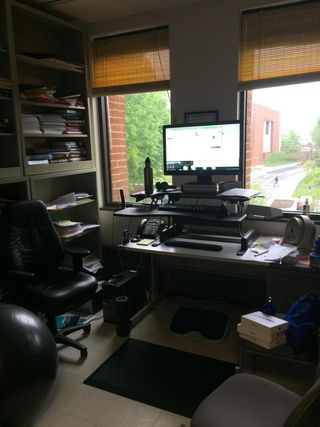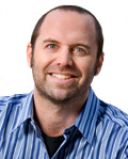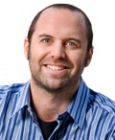Productivity
An Essential Set of Tools for Productivity at Work
Life lessons on hacking work productivity
Posted January 3, 2017
This is a modified interview from Dr. Jon Elhai's series This is How I Work:
I devote my life to understanding and enhancing the amount of well-being in this world. The majority of my time is spent conducting research in my Laboratory for the Study of Social Anxiety, Character Strengths, and Related Phenomena. I work best as a parallel processor. At any given time, I am writing up multiple manuscripts for peer-reviewed journals, collecting and analyzing new data, and fleshing out future studies. By studying multiple topics at the same time, ideas bleed into each other, and creativity is maximized.
Much of my time is also spent educating the public about science. I authored Curious? Discover the Missing Ingredient to a Fulfilling Life (William Morrow) and co-authored The Upside of Your Dark Side: Why being your whole self – not just your “good” self – drives success and fulfillment (Penguin). I am also an editor of Mindfulness, Acceptance, and Positive Psychology (New Harbinger) and Designing Positive Psychology (Oxford University Press). I regularly give keynotes and workshops to organizations as diverse as the United States Department of Defense, Customs and Border Protection, Hormel, General Mills, Gensler, the Gap, and Standard Chartered Bank. My work has been featured in hundreds of media outlets, including several articles in the Harvard Business Review, New York Times, and The Washington Post.
Location: Fairfax, Virginia.
Current Gig: Professor of Psychology, George Mason University.
One word/phrase that best describes your work: Intense.
Current computer: I have a sleek Dell Optiplex 9020 Micro at my desk and carry around a 15-inch Apple Macbook Pro with Retina Display.
What apps/tools/software you can’t live without?
Evernote premium. I keep folders in here to collect and reflect on:
- books that I read
- podcasts that I listen to
- public speaking content
- workshop exercises
- research ideas, manuscripts, grants, and books that are in development
I also use Evernote to keep a daily diary of my exercise practices and conversations with my 3 daughters. The synchronization across devices is key as I often capture content while thinking in the car. The voice recognition software is exceptional and I can fix up the details at a later date. I have an iPhone 5s and several apps are essential for me. I use Momento to keep a daily diary of my life that is essentially my gratitude journal and the ongoing story of my family life (what is sweet about this app is that it captures the feed from Facebook and organizes it into a manageable, life review). I use Write to quickly document notes that I can sync into Evernote. I use Sworkit to customize exercise routines when traveling. I use both Dropbox and Google Drive to organize my files for myself and to work with collaborators; both of these programs offer sufficient details on what members of a project contributed with time and date stamping. Dropbox is more effective for PDFs and datasets, as it is easier to open and download files. Drive is more effective for working on documents with collaborators because of the ability for multiple people to work on the same file simultaneously (changes by other people can be observed in real-time on a desktop screen).
Possibly the best new tool in my lab is Slack. With this program, which can be used as a smartphone app or on a desktop, my lab maintains multiple subgroups that archives important conversations. For instance, we have a graduate student only group where unfiltered discussions take place on projects, leadership, and opportunities (and a forum to simply vent frustrations). Any time a new, large project begins, we create a subgroup to avoid crossing streams with other conversations - which is what happens on listservs and emails. Try it, your lab will become a well-oiled machine with more enjoyable, meaningful conversations.
I use JOOL to keep a daily tracking of my sleep, presence in the moment, physical activity, creativity, energy, willpower, healthy eating, and alignment with my sense of purpose in life, in family, in work, and in my community. It sounds overwhelming but it literally takes me one minute to log in my recordings.
What’s your best time-saving shortcut or life hack?
Our brains are designed to create, not hold onto, content. It is essential to extract information and file it away into easily retrievable documents. Evernote is my savior and there is a physical notebook in every cranny of my house. When possible, I also outsource tasks that require self-control. I tie many daily activities to environmental triggers. For instance, I never think about whether to exercise on a given day because once I stroll down the stairs of my house, I turn right into a room with a yoga mat, stability ball, stability balance board, foam roller, kettle bells, dumbbells, and a Bose stereo system to blast Rage Against the Machine. When I close the door to my car, I immediately open my iPhone to find a podcast for the drive. When I turn on my computer, I immediately open up the app Clear to clarify the most personally meaningful goal to accomplish.My life has a series of automated routines which increase my efficiency – paradoxically, this offers me the greatest time and space for spontaneity and serendipity.
What’s your workspace set up like?

In my university office, I use a Varidesk Pro Plus desk that easily converts from standing to sitting position. Every writing session doubles as a core strength workout. When tired, I sit on a stability fitness ball. I have a foam roller and yoga mat for functional mobility exercises between writing surges.
How do you keep track of things you need to do (any to-do-list apps)?
I use Clear to keep my personal tasks organized. I use Fantastical 2 as my calendar that syncs with the Google calendar of myself and other members of my lab.
Besides your phone or computer, what gadget can’t you live without, and why?
Nothing else.
What everyday thing can you do better than most people? What’s your secret?
Bounce back from adversity. This is something my graduate school advisor used to comment on. For me, negative emotions and failure are motivational fuel.
My first year I applied to graduate school, I was rejected by 16 out of 17 schools. The second year, I received a $30,000 annual fellowship to attend graduate school. When my manuscripts are rejected, I will reflect on the feedback for a few hours and then immediately transition to integrating useful feedback and revising the paper for another outlet.
When I wrote my first book proposal, my agent had me revise it dozens of times for six months. Because of his constant rejections, the proposal ended up being in perfect shape and a bidding war ensued between multiple publishing houses. When I wrote my second book proposal with Dr. Robert Biswas-Diener, it was rejected by every single publisher except two that expressed interest. We flew to New York City, interviewed with them, and they both rejected us. A deflating experience. After the rejection, we took one week off and then with a fresh set of perspectives to integrate, rewrote the proposal. Because of the rejection, we ended up with a more polished proposal that led to another bidding war between publishing houses.
My list of failures in work, sports, romance, and other life domains is endless. If I think ideas are worthwhile, I am open to feedback and at the same time, relentless. The most important feature of my life is a willingness to ship my ideas to the world and not let fear hold me back.
For me, I regularly contemplate the worst things that could happen in life (such as the death of my children) and remind myself of the quick recovery time following past difficulties. In turn, I am mentally prepared for bad things to happen. As for being criticized, rejected, or disliked, I find it reassuring to view the favorite contacts on my iPhone. With a range of close friends and the availability of a wise council, there is no pressing need to win people over. I can prioritize being effective over being liked by everyone I encounter. Of course, I want to be liked, just as everyone else does, the difference is I don’t need to be liked.
It is easier to be resilient when you are doing work that is profoundly meaningful. I am fortunate that I find great purpose in mentoring students, learning new insights about human behavior and educating others about these insights. When I am stressed, my work serves as a source of sanity and stability.
What do you listen to while you work?
- God is an astronaut
- Explosions in the sky
- The cinematic orchestra
- Radiohead
- Moby
- Jeff Buckley
- Trent Reznor and Atticus Ross
What are you currently reading?
-
Becoming Wise by Krista Tippett
-
Dark Money by Jane Mayer
-
Opposable Mind by Roger Martin
-
The Dark Net: Inside the Digital Underworld by Jamie Bartlett
-
Tools of Titans by Timothy Ferriss
How do you recharge?
Daily physical exercise in a gym – this is where my mindfulness training resides. Playing with my kids. Listening to music. Reading for pleasure. Spending time outdoors. Travel to exotic places. Massages and Korean spas. Sharing whiskey with close friends.
What’s your sleep routine like?
I have a regular pattern of going to bed at midnight and waking up at 7am. I almost always read a book before sleeping and begin each day with some functional mobility work.
What’s the best advice you’ve ever received?
When it comes to the work, if nobody is upset, you are doing something wrong.
I search for the areas and angles that nobody else is looking at – sometimes this leads to creative contributions and sometimes this leads to dead ends. When you zig when nearly everyone else zags, you are going to upset somebody. This is the currency of rebelliousness.
Dr. Todd B. Kashdan is a public speaker, psychologist, professor of psychology and senior scientist at the Center for the Advancement of Well-Being at George Mason University. His new book is The upside of your dark side: Why being your whole self—not just your “good” self—drives success and fulfillment. If you're interested in arranging a speaking engagement or workshop, visit toddkashdan.com




